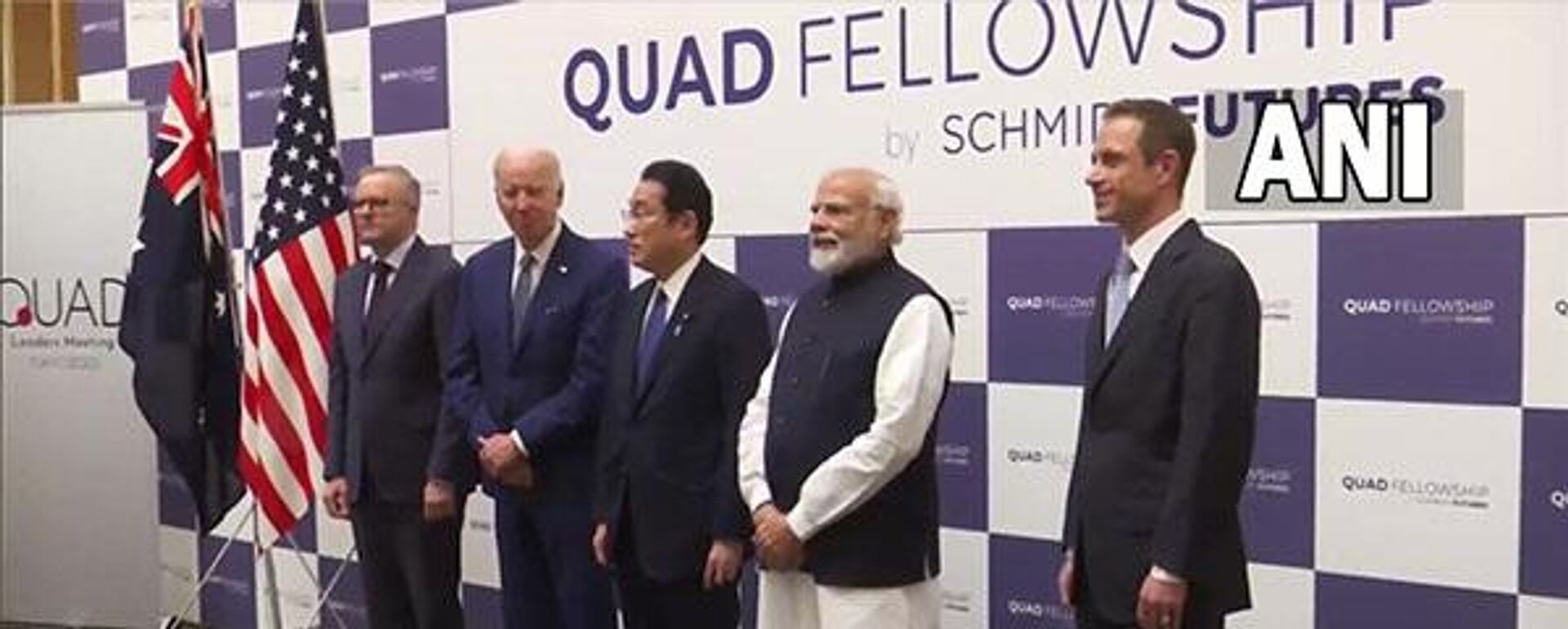https://sputnikglobe.com/20230303/quad-countries-oppose-any-unilateral-actions-in-south-east-china-seas-1107988139.html
Quad Countries Oppose Any Unilateral Actions in South, East China Seas
Quad Countries Oppose Any Unilateral Actions in South, East China Seas
Sputnik International
The top diplomats of the United States, Australia, India and Japan, which are part of the Quadrilateral Security Dialogue (Quad), said in a joint statement on Friday that they strongly oppose any unilateral actions in the South and East China Seas that can result in a unilateral change of the status quo.
2023-03-03T16:03+0000
2023-03-03T16:03+0000
2023-03-03T16:03+0000
military
quadrilateral security dialogue (quad)
south china sea
east china sea
https://cdn1.img.sputnikglobe.com/img/07e7/03/03/1107988065_0:0:3071:1728_1920x0_80_0_0_49b189b0c2f771472c3bb6ec51a3ab57.jpg
“We reiterate the importance of adherence to international law, as reflected in the UN Convention on the Law of the Sea (UNCLOS), to meet challenges to the maritime rules-based order, including in the South and East China Seas. We strongly oppose any unilateral actions that seek to change the status quo or increase tensions in the area,” the joint statement said. The foreign ministers of the Quad also expressed their “serious concern” over the militarization of disputed features, the dangerous use of coast guard vessels and maritime militia, and efforts to disrupt other countries’ offshore resource exploitation activities, according to the statement. The joint statement reflects the ongoing disputes over the maritime space in the seas and islands, which became active in 2013 when Australia joined Japan and the United States in a coalition of status quo defenders by signing a trilateral joint communique. Starting in 2013, United States officials have repeatedly stated that Washington opposes changes to the status quo made through force or coercion, including in relation to China’s East China Sea Air Defense Identification Zone (ADIZ), and its island-construction project in the South China Sea.
https://sputnikglobe.com/20220524/a-new-and-complex-phase-quad-states-pledge-to-boost-ties-in-the-pacific-amid-china-tensions-1095732329.html
south china sea
east china sea
Sputnik International
feedback@sputniknews.com
+74956456601
MIA „Rossiya Segodnya“
2023
Sputnik International
feedback@sputniknews.com
+74956456601
MIA „Rossiya Segodnya“
News
en_EN
Sputnik International
feedback@sputniknews.com
+74956456601
MIA „Rossiya Segodnya“
Sputnik International
feedback@sputniknews.com
+74956456601
MIA „Rossiya Segodnya“
quad, east china sea, south china sea, quadrilateral security dialogue (quad), australia, india. japan, united states
quad, east china sea, south china sea, quadrilateral security dialogue (quad), australia, india. japan, united states
Quad Countries Oppose Any Unilateral Actions in South, East China Seas
WASHINGTON (Sputnik) - The top diplomats of the United States, Australia, India and Japan, which are part of the Quadrilateral Security Dialogue (Quad), said in a joint statement on Friday that they strongly oppose any unilateral actions in the South and East China Seas that can result in a unilateral change of the status quo.
“We reiterate the importance of adherence to international law, as reflected in the UN Convention on the Law of the Sea (UNCLOS), to meet challenges to the maritime rules-based order, including in the South and East China Seas. We strongly oppose any unilateral actions that seek to change the status quo or increase tensions in the area,” the joint statement said.
The foreign ministers of the
Quad also expressed their “serious concern” over the militarization of disputed features, the dangerous use of coast guard vessels and maritime militia, and efforts to disrupt other countries’ offshore resource exploitation activities, according to the statement.
The joint statement reflects the ongoing disputes over the maritime space in the seas and islands, which became active in 2013 when Australia joined Japan and the United States in a coalition of status quo defenders by signing a trilateral joint communique.
Starting in 2013, United States officials have repeatedly stated that Washington opposes changes to the status quo made through force or coercion, including in relation to China’s East China Sea Air Defense Identification Zone (ADIZ), and its island-construction project in the South China Sea.



